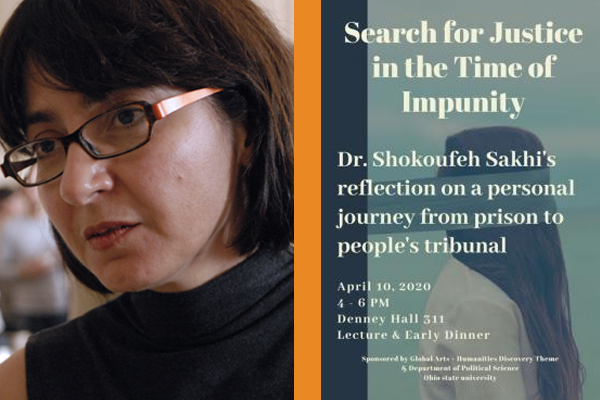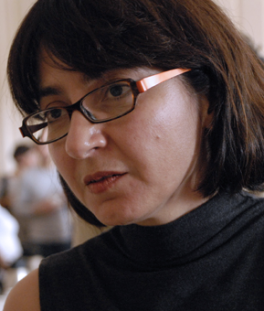
THIS EVENT HAS BEEN CANCELLED

Shokoufeh Sakhi will talk about grassroots justice-seeking movements (e.g., "transitional" justice) that are usually created after mass atrocities, such as the Iranian People’s Tribunal for which she was the executive director.
In 2012, close to one-hundred witnesses testified at Iran Tribunal against Islamic Republic of Iran. Aside from the experts, all the witnesses were ex-political prisoners and relatives of dissident men and women murdered and executed during the 1980s. Their testimonies, along with hundreds more gathered by different human rights organizations, are now part of the oral history of the formation of the Islamic state of Iran following the 1979 revolution. In light of the state’s organized attempt at re-writing and manufacturing the Iranian history, these testimonies are invaluable resources for the creation of a counter-history. These counter-historical accounts are the continuation of an off-cite Iranian resistance by different means.
Without denying the value and place of human rights organizations and their efforts in documenting the Iranian state’s atrocities in the 1980s, this presentation is a critical reflection on the limiting effects of such practices when it comes to the creation and preservation of a historical memory in a larger sense. Testimonies and witness accounts are parts and parcels of making memory, but what kind of memory do we make when we give and collect evidences of the details of a crime? How does this process affect the event of memory making? What is being collected and what is being omitted? What happens to the intricacies of the protagonists’ lived experiences, subjective and objective, of and in that historical event which they are testifying about? Through a close look at a few of these testimonies, my own included, I will discuss the importance of striving for ever fuller accounts of the encounter between an oppressive state and its dissidents, accounts beyond the recollections of the violence committed and the suffering endured, especially for an ongoing struggle and resistance, which is the Iranian case.
Biography
Shokoufeh Sakhi is currently a member of Pathologies of Solitude research network, a project hosted at Queen Mary University, London. She has a doctorate in political science from York University, with a specialization in political theory and philosophy. Her dissertation, Ethics and the Subject of Resistance: Levinas, Foucault and Marx, is focused on the distinction between ‘ethical’ and ‘survival’ objectives, a distinction through which resistance and capitulation may be elucidated.
Sakhi came to Canada as a political refugee in 1992, two years after her release from Evin prison in Tehran. She was a student and a political activist during and after the 1979 revolution. She spent eight years in several prisons in Iran as a prisoner of conscience.
She acted as executive committee director (2013-2014) of the Iran Tribunal Foundation investigating the Iranian state’s crime against humanity in the 1980s. She also testified as an ex-political prisoner at the Iranian People’s Tribunal hearings held at the Hague (2012).
Among many documentaries, she participated in the The Tree That Remembers, an NFB documentary film on experiences of Iranian political prisoners in the first decade after the 1979 revolution. Her most recent publication is “Ethical-Political Praxis: Social Justice and the Resistant Subject in Iran” in Iran’s Struggles for Social Justice (Palgrave 2017).
